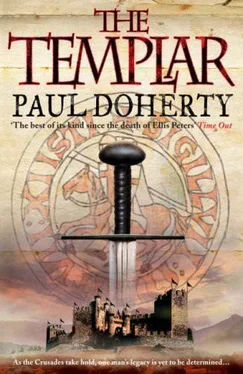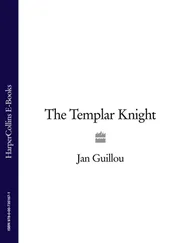P. Doherty - The Templar
Здесь есть возможность читать онлайн «P. Doherty - The Templar» весь текст электронной книги совершенно бесплатно (целиком полную версию без сокращений). В некоторых случаях можно слушать аудио, скачать через торрент в формате fb2 и присутствует краткое содержание. Год выпуска: 2010, ISBN: 2010, Издательство: Minotaur Books, Жанр: Исторические приключения, на английском языке. Описание произведения, (предисловие) а так же отзывы посетителей доступны на портале библиотеки ЛибКат.
- Название:The Templar
- Автор:
- Издательство:Minotaur Books
- Жанр:
- Год:2010
- ISBN:9780312576837
- Рейтинг книги:5 / 5. Голосов: 1
-
Избранное:Добавить в избранное
- Отзывы:
-
Ваша оценка:
- 100
- 1
- 2
- 3
- 4
- 5
The Templar: краткое содержание, описание и аннотация
Предлагаем к чтению аннотацию, описание, краткое содержание или предисловие (зависит от того, что написал сам автор книги «The Templar»). Если вы не нашли необходимую информацию о книге — напишите в комментариях, мы постараемся отыскать её.
The Templar — читать онлайн бесплатно полную книгу (весь текст) целиком
Ниже представлен текст книги, разбитый по страницам. Система сохранения места последней прочитанной страницы, позволяет с удобством читать онлайн бесплатно книгу «The Templar», без необходимости каждый раз заново искать на чём Вы остановились. Поставьте закладку, и сможете в любой момент перейти на страницу, на которой закончили чтение.
Интервал:
Закладка:
‘We have given the gates names,’ Hugh declared. ‘The furthest east, leading to Aleppo, will be called St Paul’s. The second, moving from east to west, is the Dog Gate, which opens on to the river. The third, where the Orontes skirts the city wall, is the Gate of the Duke. No,’ Hugh fended off a question, ‘this is not as vulnerable as you think, as it is protected by a tangle of marsh. Further along there is a bridge spanning the Orontes; at the end of this stands Bridge Gate. The most western gate leading down to the port of St Simeon and the sea is the St George Gate. What you must realise is that to attack any of these gates we have to cross the Orontes. However, because we don’t have enough men to attack all five at the same time, the Turks can sortie from any other gate left free and trap us against the walls.’
‘Hugh speaks the truth,’ Theodore confirmed. ‘We cannot lay siege to all five gates.’
‘So the Turks can come and go as they please,’ Imogene declared. ‘Either through one of those main gates or through the postern doors up in the hills that we cannot guard.’
‘Could we cross the Orontes?’ Eleanor asked.
‘No,’ Theodore replied. ‘The Turks would hurl missiles at us, launch sorties and trap us against the river or the wall. Moreover, that stream as well as the Orontes turns the ground very marshy, ill-suited for a camp especially as winter approaches, when the rains and snow will soon swell the waters.’
‘Think!’ Hugh plucked the chart from Simeon’s fingers. ‘Antioch is like a sprawling garden that can only be entered from the north whilst those inside may leave by a number of routes.’
‘Then why besiege it?’ Beltran asked. ‘Why not just go home?’
‘God will help,’ Peter Bartholomew declared.
‘With what?’ Beltran jibed.
‘His help!’ Peter Bartholomew’s shout sent the birds fluttering above them. ‘He will help! He will send his angels.’
‘I sincerely hope so,’ Beltran whispered, though loud enough for the rest to hear.
Eleanor realised the coming siege would be a crisis. She had a deep sense of oppression and found herself going more often to Alberic or Norbert to be shriven. These men of God, however, were resolute in their belief that the army would eventually be victorious. Both encouraged Peter Bartholomew’s increasing urgency to describe the visions of the night.
The Army of God prepared itself and moved down towards Antioch. A brief but brutal foray was launched to capture the so-called Iron Bridge, which forded the Orontes to the north-east of the city and controlled the road to Aleppo and Damascus. A savage mêlée ensued, with the Franks forming testudos to take the fortress commanding the bridge. Eventually it fell, and the Army of God moved into the foothills leading down on to the plain of Antioch. They deployed before the city during the last week of October, just before the Feasts of All Saints. Camp was pitched and Eleanor rode out with commanders of the Poor Brethren to view the city’s defences. These seemed absolutely formidable: a range of turrets and towers above which the green sheen of orchards shimmered. Hugh and Theodore’s description was perfectly accurate. The Orontes twinkled in the sun; on the other side of it lay a stretch of marshy land, then that wall with its massive towers, one either side of all five gates. Above these frontal defences rose the peak of the highest hill which, Eleanor learnt, was called Silpius; from that soared an impregnable citadel with a commanding view of the countryside on all sides.
The Army of God immediately moved to besiege some of the gates. Bohemond, supported by Robert of Flanders, set up camp before St Paul’s Gate on the far east of the city. Raymond of Toulouse encamped in front of the Dog Gate, Godfrey of Bouillon before the Gate of the Duke. Bridge Gate and the St George Gate, however, not to mention the Iron Gate, the heavily fortified postern door at the rear of the city, were left unguarded; the Franks simply lacked the men to besiege these as well. The Army of God glared at the obstacle before them whilst the Turks beyond the walls stared back. Debate raged fast and furious. What was to be done? A great council was convened. A large pavilion plundered from the enemy was erected, the ground beneath it covered with looted prayer carpets. Godfrey of Bouillon was given the chair of state, beside him Adhémar of Le Puy in full episcopal robes. Special stools were arranged for the rest: Hugh of Paris; the yellow-haired giant Bohemond; Robert of Flanders, constantly stroking his own face; Robert ‘Short-breeches’, Duke of Normandy, flushed as ever, one hand on the buckle of his war belt, the other grasping a goblet of wine. Next to these sat their Greek adviser Tacticius, his false metal nose gleaming in the sunlight. Count Raymond, grey-faced and sweat-soaked, after recovering from his malignant contagion, opened the debate. Behind him Hugh and Eleanor were given places of prominence to witness what happened. In the end, nothing did. Count Raymond advised a swift, brutal assault on the city but the rest declared they would wait. The council meeting broke up and everyone drifted away to pursue their own gains.
A strange period, as Eleanor wrote in her chronicle, as if it was a holy day during a festive season. The Turks were locked up in Antioch so the Army of God was free to go on a foraging spree of plunder and rapine, scouring the surrounding countryside for food, wine, women and livestock. For two weeks they gobbled the rich fat of the land. The entire camp was given over to revelry and drinking. They almost forgot Antioch until the Turks struck, sallying out in swift, savage raids. They left by the Iron Gate at the rear of the city, seized the heights above Bohemond’s camp near St Paul’s Gate and poured down a heavy hail of arrows and other missiles. To bring the battle to the enemy, Bohemond retailiated by building a tower he named Malregard, or Evil Look, to protect his position, whilst Duke Godfrey constructed a bridge of boats across the Orontes to reach the Gate of the Duke. Meanwhile, Tancred took the heights above the St George Gate and bided his time.
The siege now began in earnest. The days of revelry were over. The Army of God had plundered vineyards, pits of grains and orchards, their trees bending heavy with fruit. Now, as the winter rains lashed in, the countryside was stripped bare of produce. The Turks released Armenians into the camp to act as spies but kept their wives and children as hostages to fortune as well as to war. If any of these spies were caught, Bohemond had them paraded before the walls and summarily decapitated. The Turks responded just as cruelly. The Armenian patriarch who sheltered in the city was taken up on to the ramparts and hung upside down over the battlements, where the soles of his feet were beaten with rods. Frankish prisoners were also exhibited on the walls before being decapitated, their heads flung by catapults into the camp. Eleanor was one of those deputed to collect such grisly objects and wrap them in linen for decent burial. She did so carefully even as she wondered about the cry of ‘ Deus vult! ’ and the will of God. One burial particularly haunted her, that of Adelbaro, Archdeacon of Metz. He had gone into the woods near Bridge Gate to play dice with a young woman from the camp. They regarded it as a festival day, taking wine, fruit and bread. A Turkish troop burst out of the city and invaded the orchard, driving out all who sheltered there, including Adelbaro and his sweet maid. Both were captured and taken back into the city. Just before darkness fell, Adelbaro was dragged up on to the battlements and decapitated, whilst the young woman was publicly stripped and repeatedly raped, her cries ringing out through the darkness. At dawn she was stabbed and her head was cut off. Just as Father Alberic was finishing Mass, the whoosh of a catapult cut across his blessing and the severed heads of the pair were hurled into the camp. They bounced along the ground, then stopped, objects of horror with their gaping mouths and startled eyes. Theodore, Eleanor and Simeon collected them in linen sacks and buried both together in a hole beneath a pile of rocks, whilst Alberic sprinkled holy water with his asperges rod. Afterwards Eleanor sat and sobbed in her tent as Simeon the Scribe, anxious about his mistress-sister busied himself over this task or that. From outside came the sound of more catapults delivering their gruesome burdens. Shouts and cries echoed. Somewhere a monk began to chant the hymn ‘In Cruce Christus Dominus Vincit Mundum’ — ‘On the cross Christ the Lord Conquered the World’.
Читать дальшеИнтервал:
Закладка:
Похожие книги на «The Templar»
Представляем Вашему вниманию похожие книги на «The Templar» списком для выбора. Мы отобрали схожую по названию и смыслу литературу в надежде предоставить читателям больше вариантов отыскать новые, интересные, ещё непрочитанные произведения.
Обсуждение, отзывы о книге «The Templar» и просто собственные мнения читателей. Оставьте ваши комментарии, напишите, что Вы думаете о произведении, его смысле или главных героях. Укажите что конкретно понравилось, а что нет, и почему Вы так считаете.












